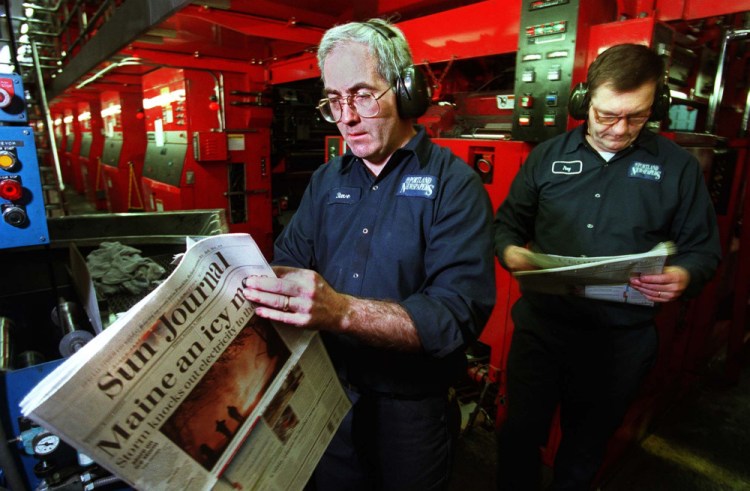In less than two weeks, one man will own four of Maine’s seven daily newspapers and more than a third of its weekly newspapers.
Reade Brower’s announcement Monday that he will buy Sun Media Group, the company that publishes Lewiston’s Sun Journal and a host of weekly newspapers, comes as sales and ownership consolidation are increasingly common in the industry around the nation. Brower already owns MaineToday Media, which publishes the Portland Press Herald and its sister papers, and four weekly papers in midcoast Maine.
But even as more of Maine’s newspapers come under Brower’s control, the deal also is an example of how the state’s media market is bucking the national trend. While buyers in most of the country are large chains or investment groups, Brower is a resident of Camden who owns media companies in Maine, New Hampshire and Vermont.
“You’ve had more of an independent newspaper environment in Maine,” said Penny Abernathy, a professor at the University of North Carolina’s School of Media and Journalism.
CONSOLIDATION, 900 FEWER OWNERS
A UNC study found that more than a third of the country’s newspapers have changed ownership since 2004, and that some sold more than once in that period.
“Today there are at least 600 fewer newspapers and almost 900 fewer owners than in 2004,” the study states. “Circulation has dropped 25 percent. As newspapers and owners fell by the wayside – and circulation declined along with profits – consolidation in the industry increased. The largest chains grew even larger, as a new type of owner emerged.”
By 2014, investment companies owned more than 1,000 of the newspapers included in the study – a nearly threefold increase from 10 years earlier – and 47 percent of the total. The largest of these companies in 2017 is New Media/GateHouse, which owns more than 450 newspapers, according to an update of the UNC study released in March.
But GateHouse only owns three newspapers in Maine – weeklies in York County. Two daily newspapers – the Journal Tribune in Biddeford and the Times Record in Brunswick – and a handful of weeklies in southern Maine are owned by the Pennsylvania-based Sample News Group. The Bangor Daily News and its affiliated weekly newspapers are still family-owned. The majority of Brower’s holdings are in the state, and as many as two dozen Maine weeklies not under his ownership are still run by families, local chains or independent owners.
Abernathy, who authored the study, suggested Maine has avoided a heavy national influence in part because the state did not have a large number of newspapers to begin with.
“A lot of the large investment entities like GateHouse, they were built as papers filed for bankruptcy,” she said. “They tended to go in and buy whole chains. You haven’t had a lot of that.”
Maine also has a smaller and more geographically scattered population than a state like Massachusetts, where national chains have a more significant presence.
“These chain owners like to have large groups of papers in one geographic cluster, and the population of Maine being what it is, you can’t really put together a particularly large cluster,” said Dan Kennedy, a media commentator and associate professor at Northeastern University.
EFFICIENCIES IMPORTANT TO SURVIVAL
Still, Brower soon will own a significant share of Maine’s media market.
To the Costello family, which has operated the Sun Media Group for more than a century, that wasn’t a deterrent for the sale.
“In order to meet the changing demands in the digital world we live in, you need scale to do that,” said Steve Costello, the company’s vice president of advertising and marketing. “Community journalism is the backbone of what our democracy was built on. … It will enable the local press to continue.”
As national chains have scooped up local newspapers, they have typically cut staff and consolidated publications to save money. Media industry experts said they would watch for the same trend as so many of Maine’s newspapers come under one person, even if that person is local.
“When you put together a group like this, you’re looking for various economic efficiencies,” Kennedy said. “I would hope that one of those efficiencies won’t be eliminating the positions of reporters, editors and photographers. That’s what I would be watching.”
When the sale was announced Monday, editors at the Sun Journal and the Forecaster weeklies said they hope a sense of competition will remain between the papers despite a common owner. Rick Edmonds, a media business analyst at Poynter Institute, said that is possible. For example, in North Carolina, the national company McClatchy owns the Raleigh News & Observer and last year purchased its competitor, the Herald-Sun of Durham. The papers have remained separate, Edmonds said.
But Edmonds is interested to see the ways in which the newspapers collaborate with each other as well.
“They can do that without sacrificing their independence,” he said. “If we can make papers stronger by sharing content, I’d be kind of curious to see how it plays out.”
NEW OWNER PLEDGE TO EMPLOYEES
All of the papers at the Sun Media Group will continue publishing when the sale closes Aug. 1. Employee contracts were not part of the transaction, but it is anticipated that most, if not all, of Sun Media Group’s 225 employees will be rehired for their current jobs and pay rates. Brower said Monday that he wanted to reassure employees that their lives would not change dramatically.
“I don’t believe in cut and slash,” Brower said in an interview with the Press Herald. “I think that’s one of the reasons why the Costellos were looking at an organization like ours to lead (Sun Media Group) forward. … We’re not going to do anything to disrupt the autonomy.”
At newspapers that Brower has acquired in the past two years, editors said that promise has held up.
Cliff Schechtman, executive editor of the Press Herald, described Brower as “a hands-off owner.” When Brower bought MaineToday Media in 2015, almost every employee was rehired.
“He’s committed to our mission of watchdog journalism and understands that requires resources to do it well,” Schechtman wrote in an email.
UNCERTAIN FUTURE FOR NEWSPAPERS
Last year, Brower and investor Chip Harris also bought two family-owned newspapers in Vermont – the Rutland Herald and the Barre-Montpelier Times Argus. Rob Mitchell, general manager of the Rutland Herald, said his family had owned the papers for more than 70 years before the sale. Some employees left because of earlier financial trouble and a small number of positions were eliminated, but Mitchell said the staff has been stable since September.
“It’s definitely a time in newspapers when you’ve got to be as efficient and lean as you can be, but he has also not gone the route of so many other papers where you’re cutting so much you destroy the product,” Mitchell said of Brower.
Experts said the challenges of the newspaper industry make the future difficult to predict.
“By creating a larger Maine group, it’s possible that he will be able to offer something that is more attractive to advertisers, and therefore, that would benefit readers and employees alike,” Kennedy said. “It’s possible that he’s trying some kind of consolidation so that he can turn it around and sell it to somebody like GateHouse.”
But Kennedy said his impression is that Brower has been a good steward of his newspapers.
“He may be determined to be the last guy standing in Maine,” Kennedy said.
Megan Doyle can be contacted at 791-6327 or at:
mdoyle@pressherald.com
Twitter: megan_e_doyle
Send questions/comments to the editors.





Comments are no longer available on this story